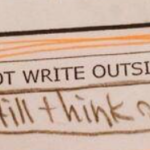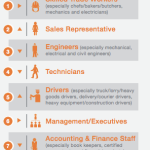A question not discussed often enough in school staffrooms is ‘what are we all doing here?’ The purpose of schooling is one of those rarely-visited assumptions: we all think we share the same mission but, on closer examination, those assumptions can frequently differ widely.
In Valerie Hannon’s* new book, Thrive: Schools Reinvented For The Real Challenges We Face the case is powerfully made that the point of schools is to create thriving societies: “education has to be about learning to thrive in a transformative world.” In the following 150 pages she takes the broadest of overviews, forensically analysing the scale and scope of those transformations – challenges that only our young people will be faced with (since baby boomers like myself won’t be around when the full implications of what we’ve created becomes clear). The threats of global warming, the rise of the robots and artificial intelligence, the religious and cultural tensions heightened by mass migratory populations – and lots more besides – are all familiar concerns in future-focussed books. What makes this book so important, however, is that each of the transformations is examined in the light of the implications for education, with a clear set of recommendations. Going still further, with the help of Amelia Peterson, Hannon has searched the planet looking for schools already successfully responding to these challenges. In doing so, any possible excuse that schools shouldn’t, nor couldn’t, be concerned with the bigger picture, is artfully demolished.
If the main driver for education reform is getting into the PISA top ten, can schools be blamed for putting on the blinkers and ignoring the predicted revolutions in how we will work, live and learn?And this is the critical point we’ve reached in education systems in developed economies: since most of the political and policy imperatives are fixated on performance, who is responsible for purpose?
To which one might answer ‘if not us, then who?’ and ‘if not now, then when?’
Hannon proposes that the re-conceptualising of school needs to happen on four levels:
- Intrapersonal – creating a secure sense of self and wellbeing;
- Interpersonal – respectfully engaging in learning and loving relationships;
- Societal – navigating an uncertain, changing work landscape and reinventing authentic democracy;
- Global – living sustainably, acquiring global competence.
Each of these is analysed in turn – the depth of research in this densly-packed book is impressive – and through a refreshingly humanist perspective. In many ways this book is simply about love – for elders, for communities, for oneself and, of course, for learning. It’s a measure of how fearful, how transactional and utilitarian learning has become, that one should be surprised by an educator calling for loving relationships as a key outcome of schooling. The reason why this book can’t be dismissed as a hippy alternative to the data-driven dominant narrative, is that Hannon shows, through the many descriptors of outstanding schools arould the world, that a more humanist vision isn’t an excuse for poor test scores – it can be the key to improved outcomes, as many of the schools highlighted have demonstrated.
It’s encouraging to see that conversations about how education can re-think its purpose to enable our current students to thrive, not just survive, this turbulent future, are starting to spring up all over the globe. Organisations like Big Change Foundation, Ashoka Foundation, The XQ Project, are merely the tip of an iceberg that is slowly moving the dial, filling the vacuum of vision left by governments enslaved by ‘deliverology’. But these conversations need to happen in every school staffroom, in every community centre and in every boardroom around the world.
We don’t need permission to re-imagine education so that our young people can face the future confidently, with the kinds of skills and understanding needed to solve the problems we face. We don’t need permission to rethink curriculum so that we foster global competence, learner agency, positive mental health, sustainable communities, entrepreneurship and, yes, academic achievement.
We can do this now.
*Full disclosure: Valerie is a friend and work colleague at the Innovation Unit UK. Allowing for that, I would have found this book to be an important contribution if she were a complete stranger.
Related Posts
Also published on Medium.
Social tagging: ashoka > big change > PISA > valerie hannon > XQ



